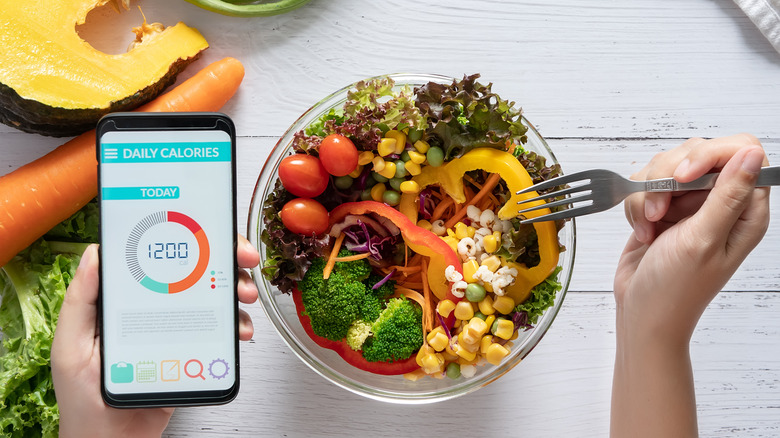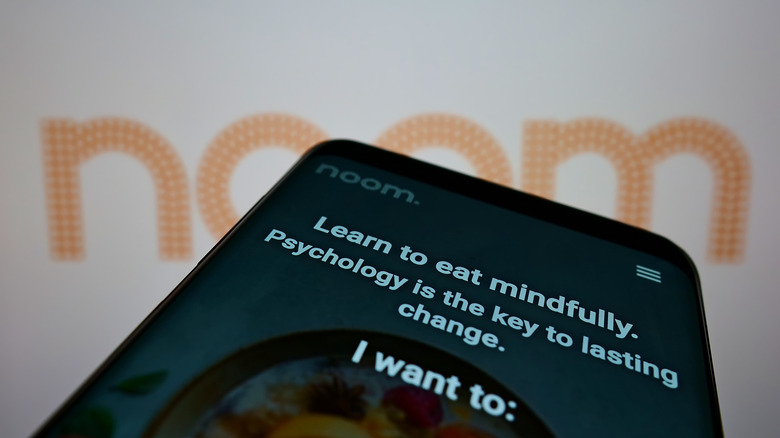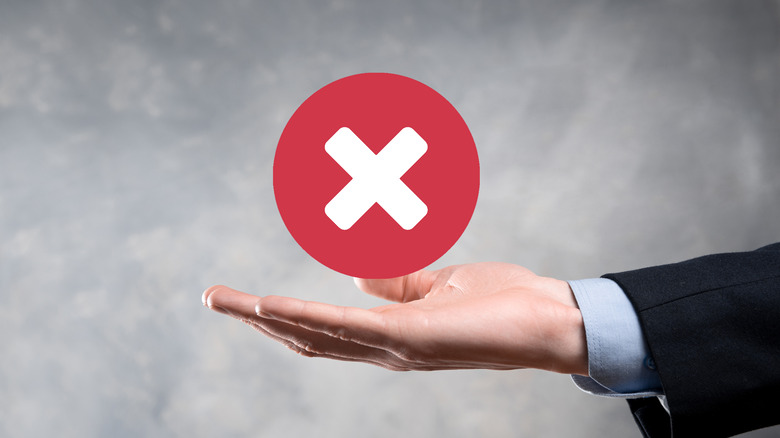What You Need To Know About Noom
This article contains information and discussions about disordered eating. If you are struggling with disordered eating, or know someone who is, help is available. Visit the National Eating Disorders Association website or contact NEDA's Live Helpline at 1-800-931-2237. You can also receive 24/7 Crisis Support via text (send NEDA to 741-741).
Who doesn't want to feel and look better on a daily basis? For many people, getting and staying healthy is an ongoing quest. Healthy living is relative and can sometimes feel like a serious struggle, especially since we live in a world that doesn't regularly encourage us to make nutritious, holistic choices. (In many circles, the inexact charge to "lose weight" is still the dominant advice). Because of this, many people are left to look for assistance on their weight loss or health journeys.
One program that has taken social media by storm over the last few years is Noom. If you follow any wellness content on Facebook, Instagram, or TikTok, you've probably seen the ads for yourself. While Noom encourages its users to "stop dieting," many users and professionals do, in fact, see it as a diet, given the fact that you must restrict calories to stay on the plan (via Psychology Today).
Some have seen incredible results using the program. Others, unfortunately, have had a less than positive experience, with claims that using Noom has triggered disordered eating patterns. That's why we've decided to take a closer look at the app to get the scoop on what you should expect should you choose to use it. Here's everything you need to know about Noom.
Noom aims to use psychology
You may be wondering what sets Noom apart from every other diet program that asks you to count calories and track your weight. According to WebMD, Noom is slightly different from other popular programs because it focuses on a psychology-based approach to help you reach your goals. This method undoubtedly sounds refreshing for those who have tried other diet plans in the past and found them difficult or unhelpful.
The idea behind this app is that it will teach you new ways of thinking about food so that you can make more well-informed choices. Considering all the info you need is right there in the app, there is a convenience factor to this plan that's undeniably easy. While Noom does focus on nutrition, you can also supposedly find advice and help with mental health issues and exercise plans.
Whether or not this program actually helps most people achieve better mental health, the idea of using an app to modify your behaviors around food and exercise is a novel approach that attracts a wide swath of customers interested in trying something new.
The company has been around since 2008
Chances are that if you've heard of Noom, you got your first scoop on the program a few years ago at the earliest. While social media is seemingly responsible for the program's rise in popularity over recent years, the company has been around for a while. According to company information, Noom was founded all the way back in 2008. However, in those days, the company mostly provided a way for users to track their food intake and exercise. It wasn't until 2014 that the psychology component came into the mix with the help of Dr. Andreas Michaelides, who is now Noom's Chief of Psychology (via the American Psychological Association).
The next year, in 2015, Noom took its offerings a step further by providing customers with individual health coaching (via Inc). Over the past seven years of operation, the company continued to expand as more and more health coaches were hired. Now, in 2022, Noom looks much different from when it first started.
Many Noom employees work virtually
Not too long ago, Noom seemed like a great option for those looking for a work-from-home job. Many of the company's employees are virtual health coaches, meaning they're the ones talking to Noom users about health and nutrition. As of early 2021, the company boasted around 1,700 virtual health coaches, according to The Penny Hoarder. But since then, the company has decidedly shifted its focus, with Insider reporting that Noom has laid off around 25% of its wellness coaches.
This change is apparently due to adjustments in the way Noom operates. Previously, clients could text with their health coaches using a chat function. Now, the company is looking to shift to video calls, which will apparently require fewer coaches. However, per comments to Insider, the coaching staff that remains at Noom is expecting a higher caseload — at least, initially. Employees who happen to snag a job at the company may not want to stay there long anyway. On Indeed, former workers gave the company a middling 3.6 rating.
Some complain that the coaching is lacking
Effectively, the crux of Noom's program is calorie-counting. Users eat in a caloric deficit, which should lead to weight loss (via Healthline). However, plenty of other apps and programs offer calorie-tracking services. The popular website MyFitnessPal is an example. What supposedly sets Noom apart is the coaching element, designed to help you get and stay on track more easily. But does it really work?
According to NBC News, some users find the coaching largely useless. This is because they say it's unreliable at best and "practically nonexistent" at worst. Some say they've mostly received feel-good advice that doesn't seem tailored to their specific experience. And, if you're paying the big bucks to use this program, you'll probably want to make sure you're chatting to another human at the other end of the line.
Additionally, you may be disappointed to find out the health coaches that work for Noom don't need to be Registered Dieticians — or even have a background in nutrition. Instead, Noom offers its own in-house training to potential coaches. If you're ready to spend a good deal of money to get your health on track, you may be better off meeting with an actual nutritionist who has the knowledge and education to support their advice.
Early studies show the plan may be effective
Do some Googling on Noom, and you'll see that it's a controversial app. Still, there is some early evidence that the program may be effective at helping at least some people lose weight. According to Insider, one study conducted in 2016 on 35,921 participants found that 78% of those people had lost weight after using Noom for a year and a half. Another study conducted a year later in 2017 showed that over six months, many users reported losing weight. They also claimed that speaking with their support groups helped them follow the plan more carefully.
It's important to remember that these studies aren't comprehensive, and there's a lot we still don't know about the program and its effectiveness. Small sample sizes and a lack of long-term data mean that new Noom users should be careful with their expectations of the program. While it may help some people lose weight, that doesn't mean it's right for everyone or that everyone will benefit from this kind of plan. In fact, it could be harmful to some, so many sure you check with your doctor before starting this or any other nutrition or weight-loss program.
No foods are off-limits ... technically
Noom loves to bill itself as "not a diet," but is that true? Use the app for a single day, and you'll realize that's not truly the case. Noom says that part of what makes it special is the fact that you can eat anything while on its diet plan. Technically speaking, no food is off-limits when you're on Noom. However, the app's method of categorizing different foods as "green" (eat a lot of it), "yellow" (limit your intake), and "red" (don't eat too much) can effectively create a system in which some foods are seen as "good" or "bad."
NBC News says that these categories can be problematic. While it's great to eat plenty of fruits and vegetables — which mainly fall into the "green" category on Noom, high-calorie, nutrient-dense foods are often placed into the yellow or red categories. For example, nuts, seeds, legumes, and fish are generally high in calories but provide important nutrients we need to feel our best. By limiting your intake of these foods, you could be missing out on fares that are quite good for you despite their calorie content. And, if you can't even put some oil on your salad to make it more appetizing, you may be less likely to stick with the diet in the long run, anyway.
Users have struggled with cancelling the plan
Whenever you use a service like Noom, there's no telling whether it will work for you or not until you get started and try it out. This first experience with the app may encourage some people to explore the program further. But others will realize that the setup isn't ideal for them. Those people should be allowed to cancel their plans without any problems, right? Well, as it turns out, it seems like some are having issues with quitting Noom.
Though Noom offers an introductory price for people who want to try the program out without committing to it, the price increases drastically after that first week or so. However, WebMD reports that many users have complained that they cannot cancel their membership during the trial period.
As of the time this article was written, the company has only 2.6 stars on the Better Business Bureau. Some 2,000-plus complaints have been filed with the organization within the past three years alone. Obviously, you're not going to want to see a Noom bill pop up in your bank statements after you thought you already canceled, so it's something to keep in mind if you decide to give the app a try and then come to the conclusion that it doesn't work for you. Nobody should need to be on an hour-long phone call just to get their money back.
There have been complaints that Noom can trigger disordered eating
Noom has a few issues working against it, but perhaps the most significant problem is the fact that some have claimed that Noom has triggered them into developing disordered eating. Considering Noom's highly restrictive nature which seems (for all intents and purposes) to definitely be a diet, it's not too surprising that customers feel this way.
Kelly Hoover Greenway wrote about her experience using the app for Cosmopolitan, saying that Noom "wrecked her relationship with food." The fact is, our society's obsession with thinness and weight loss can have extremely negative consequences for those who buy into the hype. While Noom tries to separate itself from '90s-era, thin-obsessive rhetoric, it's really not that far removed from the toxic mentalities that wellness culture can perpetuate.
Greenway writes, "Beneath the rhetoric and repositioning, it's the same old shtick. These new — and new-and-improved — "wellness" apps are often inextricably bound up with the pursuit of slimming down. The slogans might be about loving your body. Still, the not-so-subliminal message is that losing weight will make that more possible."
Noom asks users to restrict calories
According to WebMD, a calorie deficit is one strategy for losing weight. However, for people who have suffered from eating disorders, counting calories can be a trigger to relapsing into serious and dangerous mental health concerns, per Duke Health. Unfortunately, Noom relies on calorie-counting to help users lose weight. Although this may be an effective method for some, it's definitely what most people would describe as a "diet." Considering that Noom prides itself on its psychology-based services, some feel that the tactic is tone-deaf.
Women's Health writes, "Even though Noom tells people they don't have to diet, many think of it as a restrictive eating plan. Some critics say the daily calorie goal is too low and that their food labeling system may trigger disordered eating, especially in those with a history of an eating disorder."
Oftentimes, the suggested calorie intake for users is very low. When we gave the program a try, Noom suggested that we consume around 1,400 calories a day. Although this may be a viable goal for some portion of the population trying to shed weight, eating such few calories can be a serious struggle for many, especially if they're leading an active lifestyle.
Noom focuses more on weight loss than health
Excess weight can cause a wide range of health problems (via Harvard School of Public Health). However, a lot more goes into living a healthy life than just losing weight. According to Healthline, one of the downsides of using Noom is that it focuses on weight loss above a more holistic view of health. Regular exercise, getting plenty of sleep, and maintaining your mental health are also important facets of having the healthiest lifestyle possible, and a strict focus on weight loss can hinder those goals. If you are still physically hungry after eating all of your Noom-allotted calories for the day, there's a chance that you won't be able to give it your all at the gym, for example. As we've already mentioned, counting calories can be damaging to some people who have a history of disordered eating.
Plus, there's the issue of Noom categories labeling foods green, yellow, or red. This color-coding is meant to show users which foods are high in calories and which are not, but it could lead to some viewing particular nutritious foods, like olive oil or walnuts, as "bad" foods, which certainly isn't ideal for long-term health.
Noom's eating plan can be hard to maintain long-term
Since many people think of Noom's eating plan as restrictive, it can be difficult to stick to this kind of plan for the long term. One Reddit user shared their concerns on the Noom subreddit, writing, "My fear is that I'll be permanently hungry and/or will have to track every morsel that passes my lips for the rest of my life to maintain any kind of significant loss. None of that is sustainable, in my experience."
Calorie tracking can be helpful for a while, but doing it day after day (and trying to maintain that way of eating in the long term) is likely going to be an issue for some people on a longer-term basis. As Healthline writes, counting calories is not endurable in the long term. After all, most people don't want to have to count calories every time they go out to eat at a restaurant or go to a party where hors d'oeuvres are being served. And, of course, nobody wants to feel hungry. Some may have a good experience with Noom's eating plan, but that doesn't mean it's the perfect fit for everyone out there who's trying to lose weight.
Many believe that Noom promotes diet culture
The '90s and 2000s were the era of stick-thin celebrities, weird crash diets, and an overall obsession with thinness. Although our culture is still very fatphobic, we have made some (albeit small) improvements (via NPR). But some feel like Noom is setting us back by promoting the same old diet culture we've seen for years, per Lifehacker. However, Noom claims that it supports the idea of "intuitive eating," which is often seen as the solution to avoiding diet culture. Among other things, the principles of intuitive eating require attention and respect for your body's hunger signals rather than following instructions from an outside source. In reality, if you're painfully considering and counting every calorie you consume, you are not actually eating intuitively.
Essentially, Noom can be helpful for some people who are attempting to lose weight. But for many, it's too similar to other restrictive diets. Once you've tried Weight Watchers or Jenny Craig, you've tried them all. We don't see how Noom is all that different.












